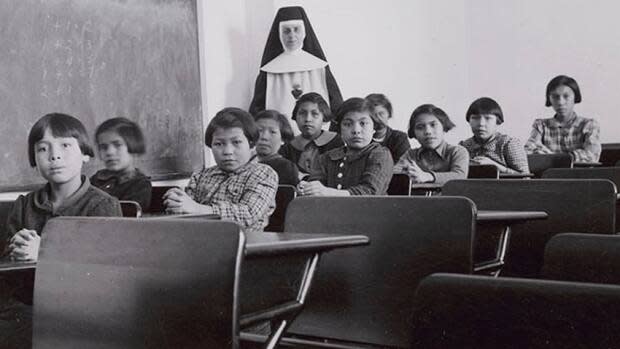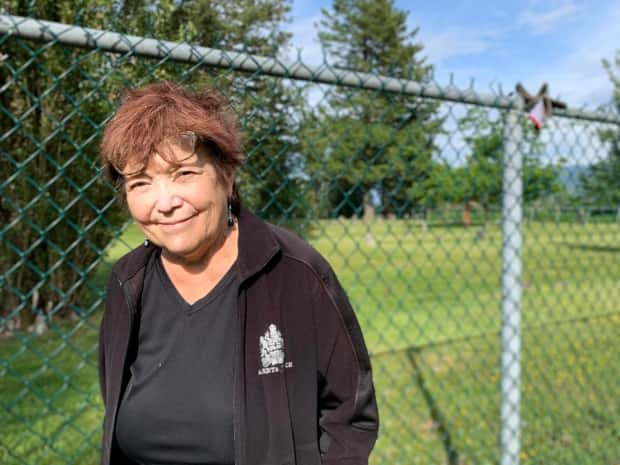Hundreds at Catholic health network demand church apologize for residential schools

WARNING: This story contains details some readers may find distressing
Close to 500 doctors, nurses and other workers from one of Canada's largest Catholic health-care networks have signed an open letter demanding that Toronto's archbishop take concrete steps toward reconciliation with Indigenous peoples.
Unity Health Toronto staff are urging Cardinal Thomas Collins and the Catholic Church to release all documents related to residential schools and the "Indian hospitals" it ran throughout the 19th and 20th centuries and issue a formal apology. Signatures come from across the network's three hospitals — St. Michael's, St. Joseph's and Providence.
"I don't think that there has ever been a call this loud from within a health-care institution directly to Catholic church leadership requesting action and accountability and reconciliation," said Dr. Suzanne Shoush, a member of the network's First Nations advisory panel, which wrote the letter.
Shoush, who is both Black and Indigenous, said the solidarity from her colleagues, including some of the top physicians in the country, is unprecedented.
The call comes following last month's discovery of what are believed to be the unmarked burial sites of children's remains adjacent to a former residential school in Kamloops, B.C.
Attention soon turned to the church's role in operating many of Canada's residential schools and its reluctance to issue a formal apology or release records.

"The time has come to listen to the voices of these children," said Cree-Métis Dr. Janet Smylie, who also sits on the advisory panel and is a Canada Research Chair in advancing health services for Indigenous people.
"Clearly there's a tension here between all of the good things organized religion, including the Catholic church, stand for — love and compassion. I do hope the actions in the coming days and weeks and months are rooted in the values the church promotes, not the bureaucracy and fears around legal consequences."
Archbishop open to meeting
Collins declined to be interviewed for this story, but is open to meeting with the advisory panel, said Archdiocese of Toronto spokesperson Neil MacCarthy. He said because the archdiocese itself did not operate residential schools, it has no records to disclose.
"The archbishop has been clear in recent interviews that most of the Catholic entities involved have shared the relevant records and that any of those who have not done so should make them available," MacCarthy said in an email Wednesday.
Smylie said to reconcile, it's important the Catholic church isn't in charge of deciding what documents are relevant, but rather an outside party, such as the United Nations; and to get a papal apology for the church as a whole.
"The system of residential schools and colonization of the Americas wasn't patchwork. It was systematic. The leaders of the Catholic church as a whole knew what they were doing," she said. "It's a legacy of the leadership and whole organization. That's why it's important that the current leadership apologize — to make it meaningful."
WATCH | Cardinal downplays need for apology:
'Immeasurable harm' continues
Shoush said the Catholic church must take more responsibility for its history of treating Indigenous people as "non-humans" who were abused and neglected in Canada's education and health-care systems. This racist sentiment was rooted in Catholic teachings and woven into Canadian society, she said.
As a family doctor, Shoush says she sees this "immeasurable harm" continue through generations, manifesting itself in Indigenous peoples' higher rates of chronic illness and shorter life expectancies compared to non-Indigenous Canadians. They're also more likely to delay seeking medical treatment and face racism and discrimination when they do, said Shoush.
Personally, Shoush's family is fighting for more information about what happened to relatives who died at a Mission, B.C., residential school run by the Catholic order the Sisters of St. Ann.
Shoush's mother Bronwyn recently said how she'd been denied access to the sisters' archives to find out what happened to seven of her father's nine siblings. They were all buried in the St. Mary's residential school cemetery.
"Why are they buried there? Who hurt them? What happened?" Shoush said of her great-aunts and uncles. "The fact that we can never know the answers, it's unbelievable."

CEO supports letter
The president and CEO of Unity Health says he supports the letter and that, in a recent meeting with Collins, the cardinal expressed regret.
"I found the cardinal to be very sorrowful for what has happened and what Indigenous people are experiencing," Dr. Tim Rutledge said in an email to staff on Tuesday, marking Indigenous History Month.
"There is clearly a need for greater accountability and action, and I support the requests in this letter."
He encouraged staff to sign it and said Unity Health is focusing on tangible actions toward reconciliation, including supporting Indigenous-led COVID-19 vaccination efforts. It's also a time for reflection, Rutledge said.
"For many, this will include recognizing ways that the actions and silences of our ancestors, as well as our actions and silences now, as settlers, have contributed to profound harm."
Support is available for anyone affected by their experience at residential schools, and those who are triggered by the latest reports.
A national Indian Residential School Crisis Line has been set up to provide support for former students and those affected. People can access emotional and crisis referral services by calling the 24-hour national crisis line: 1-866-925-4419.

 Yahoo Movies
Yahoo Movies 